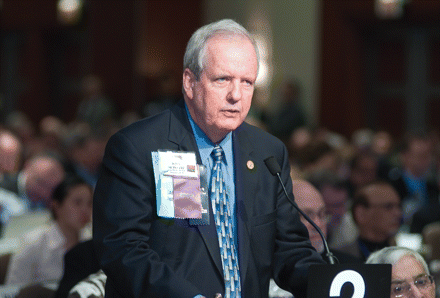AMA Rejects Challenge to Policy on Mandatory Insurance
Abstract
The AMA's House of Delegates reaffirmed its support for a policy that would require individuals to purchase a minimum level of catastrophic and preventive health insurance as part of federal health insurance reform aimed at achieving universal access to care (see What AMA Supports on Health Insurance).
After three hours of debate in reference committee hearings—where items are discussed before being brought to the house—and another hour of maneuvering on the house floor that included an attempt by opponents to allow individual states to "opt out" of the requirement, delegates approved a report from the Council on Medical Service reaffirming support for the AMA's policy of "individual responsibility."
The vote occurred at the AMA's annual policymaking meeting in Chicago in June.
The AMA policy, formulated in 2006, advocates a requirement that those earning more than 500 percent of the federal poverty level obtain a minimum level of catastrophic and preventive coverage. Only upon implementation of tax credits or other coverage subsidies would those earning less than 500 percent of the federal poverty level be subject to the requirement to obtain coverage.
The report approved by delegates in June stated, "Eliminating health insurance denials due to pre-existing conditions is not feasible without individual responsibility. Also, requiring individual responsibility limits ‘free-riders’ in the health care system who otherwise violate societal liberties because taxpayers, insured individuals, and physicians and other health care providers involuntarily pay for the care of the uninsured through higher premiums and the provision of uncompensated care. Moreover, individual responsibility supports a private market approach to covering the uninsured and expanding choice."
A minority of the delegates—mostly from Southeastern states and from surgical specialties—brought to the debate an intensity mirroring the debate unfolding in Congress and other venues over the mandatory insurance provision of the Patient Protection and Affordable Care Act (PPACA).

Former APA President John McIntyre, M.D., says the AMA's policy advocating for a requirement that individuals purchase a minimum level of insurance is necessary for expanding access while ensuring other needed insurance reforms. McIntyre was re-elected to the AMA's Council on Medical Service at last month's meeting of the House of Delegates.
But John McIntyre, M.D., a delegate to the AMA Section Council on Psychiatry and a member of the Council on Medical Service, which wrote the report, noted that the provisions in the PPACA are far more stringent than those urged by the AMA, requiring all individuals regardless of income to purchase comprehensive insurance. And others in the house on both sides emphasized that the debate was about AMA policy, not the constitutionality of the PPACA.
"This has been AMA policy for six years and was developed as the result of a lot of input from health economists and health-plan executives," McIntyre told Psychiatric News. "The consensus across the board has been that in order to achieve the other things we want, including the elimination of exclusions for preexisting conditions, eliminating caps on coverage of psychiatric care, and increasing coverage of the uninsured, it is necessary to have a provision on individual responsibility to purchase insurance."
The policy survived a last-ditch effort by opponents to allow states to opt out of the requirement. They argued that a mandate to buy insurance would lead to government intrusion and regulation of other aspects of insurance and medical practice.
"Mandates take away choice and take away personal responsibility," said Jeff Terry, M.D., of Alabama. "Mandates will lead to the government dictating what type of insurance is appropriate and will lead to more bureaucracy in the system.... And who are we to mandate that everyone has insurance so we can get paid?"
A striking example of the intensity of opposition came from Leah McCormack, M.D., of New York. "For me this is not about health insurance," she said at the meeting. "There are some things more important than health care and more important than life itself. That is the liberty to make my own decision and not have the government tell me what to buy."
But the majority position was summed up by Yul Ejnes, M.D., chair of the Board of Regents of the American College of Physicians.
"Since the 1990s, policy experts representing the entire political spectrum have stated that a personal-responsibility requirement is central to preserving subsidized private health insurance and affordable coverage for all Americans," Ejnes said. "Requiring insurers to accept all applicants regardless of health status without this individual responsibility requirement would enable people to delay buying insurance until they get sick, driving up premiums for those already in the insurance pool. It would lead to the collapse of the private insurance market and leave government programs as the only recourse for many Americans."
The full report of the Council on Medical Service approved at the June meeting is posted at <www.ama-assn.org/assets/meeting/2011a/tab-ref-comm-a-addendum.pdf>.



